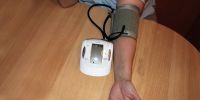As cardiovascular disease remains the Western world’s leading cause of death, heart failure is the category registering the fastest incidence increase over the past ten years.
Pathological hypertrophy, defined as the heart muscle’s growth as its attempt to increase its output, is the stage that precedes heart failure, yet not all hypertrophy is pathological. High physical exertion and pregnancy are among the conditions that cause the heart muscle to grow, however myocardial function is not affected. Prolonged, excessive and unbalanced hypertrophy renders the condition pathological, with arrythmias and heart failure as a consequence.
Findings of a study conducted by researchers at the Hebrew University of Jerusalem's Faculty of Medicine have, for the first time ever, shown that a protein called Erbin has the effect of a brake in pathological and excessive heart muscle growth. The team further revealed that damage to the Erbin protein causes excess growth of heart muscle, function decrease as well as severe pathological growth of heart muscle.
Entitled "Erbin is a negative modulator of cardiac hypertrophy" and published in the Proceedings of the National Academy of Sciences (PNAS), this study was conducted by Ms. Inbal Rachmin as part of her doctoral thesis.
When investigating the heart tissue of patients suffering from heart failure, Ms. Rachmin noted a major decrease in the expression of the protein Erbin. Furthermore, when induction of hypertrophy in mice lacking Erbin led to the early death all of these mice (in comparison to only about 30 percent mortality observed in the control group), histological examination uncovered heart failure as the main reason.
The team’s vital research findings also impact the area of breast cancer treatment as Erbin interacts with the receptor Her2/ErBb2, which is overexpressed in approximately 30% of breast cancers.
As an antibody to this receptor, patients receive the standard treatment of Herceptin, yet studies have found a major decrease in heart function among 5-10 percent of breast cancer patients who were subject to Herceptin in combination with chemotherapy treatment.
By describing a cardioprotective role for Erbin, the researchers suggests it is a potential target for cardiac gene therapy.
13 May 2014
Latest Articles
Research, Cardiac, heart tissue, heart failure, treatment, proteins, heart muscle, hypertrophy
As cardiovascular disease remains the Western world’s leading cause of death, heart failure is the category registering the fastest incidence increase ov...



























